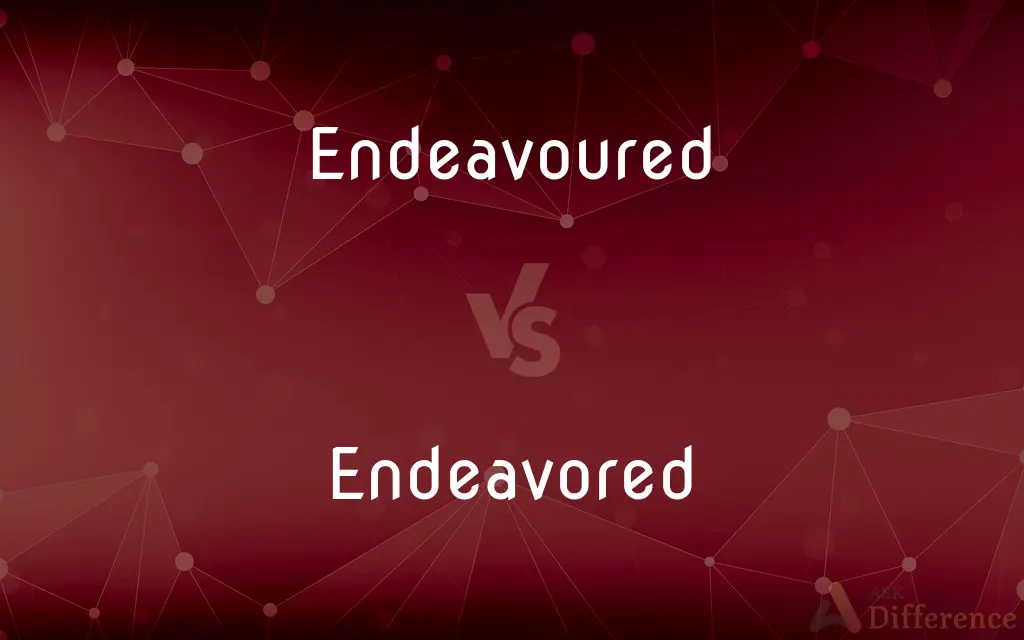Endeavoured vs. Endeavored — What's the Difference?
By Tayyaba Rehman — Published on October 4, 2023
Endeavoured and Endeavored mean to attempt to achieve a goal; "Endeavoured" is British English spelling, and "Endeavored" is American English spelling.

Difference Between Endeavoured and Endeavored
Table of Contents
ADVERTISEMENT
Key Differences
"Endeavoured" and "Endeavored" represent the same action of trying hard to do or achieve something but vary in spelling based on regional language rules. "Endeavoured" is the accepted spelling in British English, conforming to the British practice of doubling consonants, while "Endeavored" is used in American English, reflecting the American custom of simplifying spellings.
Both words are the past tense and past participle forms of the verb "endeavour" (British English) or "endeavor" (American English) and represent the effort, attempt, or strive to accomplish a task or achieve a goal. Despite their different spellings, they carry the same meaning and intent to express diligence or effort applied to achieve something, ensuring mutual understanding regardless of the variation in orthography.
Using "Endeavoured" in American English and "Endeavored" in British English could be considered a spelling mistake, reflecting the importance of adhering to regional language norms. Choosing the correct variant based on the targeted audience or publication standards is crucial to maintaining orthographic accuracy and formality in written communication.
While the spelling difference might seem trivial, it is indicative of the numerous subtle variations between American and British English, influencing the correct usage of words based on the regional language standards. Therefore, understanding the regional context and adapting the spelling accordingly is crucial for achieving linguistic accuracy and appropriateness.
Comparison Chart
Spelling Region
British English
American English
ADVERTISEMENT
Spelling Structure
"ou" spelling
"o" spelling
Meaning & Pronunciation
Both have the same meaning and pronunciation
Both have the same meaning and pronunciation
Usage Examples
Used in British publications and writings
Used in American publications and writings
Semantic Implication
No difference in meaning
No difference in meaning
Compare with Definitions
Endeavoured
Strived to attain an objective in British English.
The team endeavoured to find a solution.
Endeavored
Strived to attain an objective in American English.
The athlete endeavored to break the world record.
Endeavoured
Made an effort to achieve a goal in British English.
He endeavoured to finish the project on time.
Endeavored
Made an effort to achieve a goal in American English.
He endeavored to complete the assignment before the deadline.
Endeavoured
Tried diligently to accomplish a purpose in British English.
They endeavoured to create a unique piece of art.
Endeavored
Tried diligently to accomplish a purpose in American English.
The organization endeavored to raise awareness about environmental conservation.
Endeavoured
Attempted to achieve a task in British English.
She endeavoured to complete the marathon.
Endeavored
Attempted to achieve a task in American English.
She endeavored to learn a new language.
Endeavoured
Worked towards accomplishing something in British English.
The scientist endeavoured to discover a new element.
Endeavored
Worked towards accomplishing something in American English.
The engineer endeavored to design a more efficient engine.
Endeavoured
Standard spelling of endeavored
Endeavored
A conscientious or concerted effort toward an end; an earnest attempt.
Endeavored
Purposeful or industrious activity; enterprise.
Endeavored
To attempt (fulfillment of a responsibility or an obligation, for example) by employment or expenditure of effort
Endeavored to improve the quality of life in the inner city.
Endeavored
To work with a set or specified goal or purpose.
Endeavored
Simple past tense and past participle of endeavor
Common Curiosities
Is the spelling Endeavored acceptable in British English?
In British English, "Endeavoured" is the standard spelling, and using "Endeavored" could be considered incorrect.
Can Endeavoured and Endeavored be used interchangeably?
While interchangeable in meaning, using the correct spelling variant for your audience’s English variant is recommended.
Why are Endeavoured and Endeavored spelled differently?
"Endeavoured" is British English spelling, and "Endeavored" is American English spelling, reflecting regional spelling conventions.
Is it correct to use Endeavoured in American English?
It is preferable to use "Endeavored" in American English to adhere to regional spelling conventions.
Which spelling should I use in international publications?
Use the spelling that aligns with the publication's style guide, which often specifies British or American English preferences.
Is there any difference in meaning between Endeavoured and Endeavored?
No, there is no difference in meaning; they both represent an attempt or effort to achieve something.
Are there similar examples of spelling variations between British and American English?
Yes, words like "favour/favor" and "colour/color" follow similar British/American spelling variations.
Are Endeavoured and Endeavored used as verbs?
Yes, both are used as verbs representing the past tense and past participle of "endeavour/endeavor."
Does the spelling difference impact pronunciation?
No, the spelling difference does not impact the pronunciation; they are pronounced the same.
Share Your Discovery

Previous Comparison
How About You vs. What About You
Next Comparison
Roger That vs. Copy ThatAuthor Spotlight
Written by
Tayyaba RehmanTayyaba Rehman is a distinguished writer, currently serving as a primary contributor to askdifference.com. As a researcher in semantics and etymology, Tayyaba's passion for the complexity of languages and their distinctions has found a perfect home on the platform. Tayyaba delves into the intricacies of language, distinguishing between commonly confused words and phrases, thereby providing clarity for readers worldwide.
















































